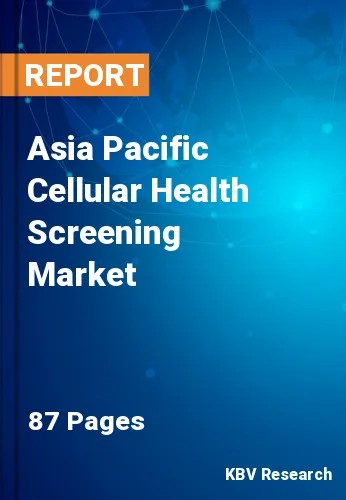The Asia Pacific Cellular Health Screening Market would witness market growth of 9.7% CAGR during the forecast period (2022-2028).
The use of cellular health screening is growing in personalized medicine. Numerous studies have demonstrated a relationship between telomere length and malignancies. In cancer that has advanced more severely, telomere shortening as a tumor suppressor emerges to be a key impact. Telomere length is influenced by a variety of factors, including inflammations, infections, and stress. Inflammation, in particular, induces oxidative stress, which leads to telomere erosion.
According to studies, telomere maintenance has a substantial impact on how environmental, behavioral, and genetic variables influence aging and related illnesses. To comprehend biological aging and genetic diseases, it is necessary to grasp how quickly telomeres change. In addition, disorders connected to aging, such as cancer, cardiovascular diseases, and compromised immune systems, have been related to telomere length decrease.
The development of telomere testing kits has proved to be a significant innovation aiding in the early diagnosis of cancers. A growing insistence on healthy life expectancy and an increment in the public's average age, accompanied by a rise in the acceptance of digital testing technologies has resulted in healthcare facilities to opt testing methods that are quick and accurate. Also, the likelihood of spotting a condition may increase if multiple tests respond to a single medical issue.
In the above middle Asia-Pacific nations and territories, lung, trachea, and bronchus cancer were the most common cancer types in 2016. In lower-middle and lower-income Asia-Pacific nations and territories, liver cancer was the leading cause of cancer fatalities in 2016. Stomach, colorectal, and breast cancer were other leading causes of cancer-related mortality. These deaths were associated with Helicobacter pylori infection and were more common in Mongolia, China, the Republic of Korea, Japan, and Vietnam. Deaths from colorectal cancer were greater in Australia, New Zealand, and Brunei Darussalam.
The China market dominated the Asia Pacific Cellular Health Screening Market by Country in 2021; thereby, achieving a market value of $354.8 million by 2028. The Japan market would showcase a CAGR of 8.9% during (2022 - 2028). Additionally, The India market is estimated to grow a CAGR of 10.4% during (2022 - 2028).
Based on Sample Type, the market is segmented into Blood, Saliva, Serum, and Urine. Based on Collection Site, the market is segmented into Hospital, Diagnostic Labs, Home, and Office. Based on Test Type, the market is segmented into Single Test Panels and Multi-test Panels. Based on Single Test Panels Type, the market is segmented into Oxidative Stress Tests, Inflammation Tests, Telomere Tests, and Heavy Metals Tests. The report also covers geographical segmentation of Cellular Health Screening market. Based on countries, the market is segmented into China, Japan, India, South Korea, Australia, Malaysia, and Rest of Asia Pacific.
Free Valuable Insights: The Worldwide Cellular Health Screening Market is Projected to reach USD 4.3 Billion by 2028, at a CAGR of 9%
The market research report covers the analysis of key stake holders of the market. Key companies profiled in the report include Quest Diagnostics Incorporated, OPKO Health, Inc., Laboratory Corporation of America Holdings, Genova Diagnostics, Telomere Diagnostics, Inc., Life Length, S.L., Repeat Diagnostics, Inc., SpectraCell Laboratories, Inc. (Beingmate Group Co. Ltd.), Cell Science Systems Corp. and Segterra, Inc.
By Sample Type
By Collection Site
By Test Type
By Country
Companies Profiled
Our team of dedicated experts can provide you with attractive expansion opportunities for your business.

